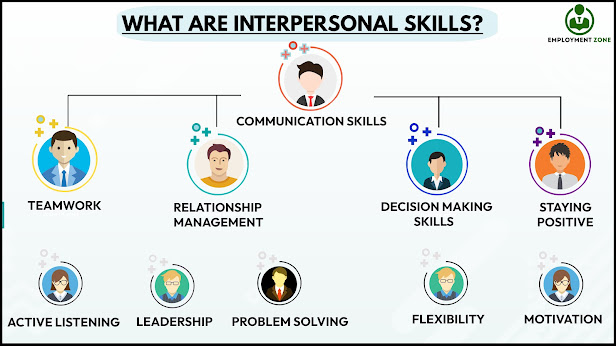Interpersonal skills are also known as social skills, and we all use them on a daily basis.
Interpersonal skills are how we interact with other people. It is highly linked to emotional intelligence, communication skills, creativity, decision-making ability, problem-solving abilities, and other traits.
You can improve your interpersonal skills by learning and practising new ones. I've compiled a list of 16 Interpersonal Skills Worth Practicing.
What are Interpersonal Skills?
Interpersonal skills are the abilities we employ on a regular basis when communicating or interacting with others, both individually and in groups. Many talents are included, but the most commonly used ones are communication skills such as listening, effective speaking, and the capacity to control and manage your emotions.
Interpersonal skills are often referred to as social skills, soft skills, people skills, or life skills. It goes without saying that interpersonal skills are the foundation for life success.
People with good interpersonal skills may collaborate effectively with others, both formally and informally. They interact positively with people, whether they are family, friends, coworkers, or consumers.
Why are interpersonal skills important?
Interpersonal skills are essential for daily life, particularly when talking and dealing with groups and individuals in your personal and professional life. People like to work with colleagues who have strong interpersonal skills.
Another advantage of interpersonal skills is the capacity to solve difficulties and make sound decisions. Interpersonal communication skills and the ability to comprehend people can be used to arrive at the best answer or make the best decision for everyone concerned.
Interpersonal Skills That Are Worth Practicing
1. Active Listening
These abilities are crucial in our communication. Active listening allows us to pay complete attention to someone when they talk and grasp what they are saying. This ability also requires paying attention to the speaker's body language and visual signals.
You can learn to be an active listener, which will aid in the development of your communication abilities and, in turn, will help you refine your interpersonal skills.
2. Body Language
Your posture, face, and gestures can convey as much information as your words. When talking with coworkers and managers, your body language must be convincing in order to establish trust.
It entails nodding, maintaining eye contact, smiling, and remaining calm. Avoid closed body language like crossed arms, restless demeanour, and eye shifting.
Consider the following factors when dealing with others:
Facial Expressions and Eye Contact
Gestures
Private space
Body posture and position
3. Communication Skills
Your ability to talk confidently and correctly for the situation can aid in efficient communication with others. When communicating, use appropriate vocabulary. For example, during meetings and presentations, speak officially and professionally.
When speaking with customers, use basic terms and avoid using complex words. Also, ask clarifying questions when necessary.
4. Decision-Making Skills
This is one of the most crucial abilities we employ in our daily lives to make wise decisions. This ability helps us make the greatest decisions in our professional and personal lives. This will be one of the most valuable abilities in the twenty-first century, and you may learn how to be strong at decision-making skills.
5. Emotional Intelligence
Empathy, or emotional intelligence, is the ability to understand others' feelings, needs, and ideas from their perspective. When conversing, empathic people are alert and kind.
Empathy can be beneficial and productive, as it can assist prevent employee misunderstandings. You are more likely to obtain your coworkers' confidence and respect if you demonstrate empathy.
6. Leadership Skills
Leadership abilities are those that you employ when managing a team or group to achieve a common goal. Leadership is a collection of skills that operate together, such as the capacity to educate and mentor, active listening, communication skills, creativity, dependability, emotional intelligence, and others.
Few of us are born leaders, but the vast majority are not. You may, however, learn to be an excellent leader.
7. Problem Solving
Problem-solving is a skill that enables you to come up with unique solutions to difficulties by going through a process of problem identification and resolution planning. This is one of the most valuable skills since an individual with strong problem-solving abilities ends up leading the team or organisation forward.
This is one of those skills that may be learned via practise and then applied to improve your problem-solving abilities.
8. Responsibility
Responsibility is the state of being in charge and accountable for something or someone. Being responsible is essential in everyday life as well as in work. Accepting responsibility is the key to having high self-esteem.
9. Staying Positive
Anger, irritation, tension, worry, uneasiness, and disappointment are all feelings that can negatively impact your mood. As a result, it's critical to have a positive attitude and to try new things that make you happy.
Positive Affirmations for Self-Awareness
I have a lot of buddies.
Others think positively of me.
I am everyone's friend.
I recognise myself and my emotions.
I feel at comfortable in the company of others.
I comprehend what others are thinking and feeling.
The others appeal to me.
I have a lot of close friends.
10. Relationship Management
Relationship management is significantly more complex and distinct than relationship formation. This is a valuable talent in a variety of vocations.
You will be expected to engage and establish solid relationships with colleagues, partners, and clients at every level of a business. The capacity to manage relationships is critical in any situation.
11. Teamwork
Employee groups that can communicate more effectively have a better likelihood of success and reaching common goals. Offer to assist your coworkers when needed and solicit opinions and ideas from them. When team members provide advise, respond constructively. When working on projects or attending meetings, be upbeat and positive.



.jpg)
Comments
Post a Comment